"If we lived on a planet where nothing ever changed, there would be little to do. There would be nothing to figure out. There would be no impetus for science. And if we lived in an unpredictable world, where things changed in random or very complex ways, we would not be able to figure things out. But we live in an in-between universe, where things change, but according to patterns, rules, or as we call them, laws of nature. If I throw a stick up in the air, it always falls down. If the sun sets in the west, it always rises again the next morning in the east. And so it becomes possible to figure things out. We can do science, and with it we can improve our lives." -Carl Sagan
As many of you know, I'm a scientist and a science educator. It's what I've chosen to do with my life, and I'm happy with that choice overall. But one thing that I find amazingly difficult to deal with is trying to explain some of the biggest ideas supported by modern science -- such as evolution, the big bang, and dark matter -- to people who respond, "well, but your theory doesn't explain _____________."
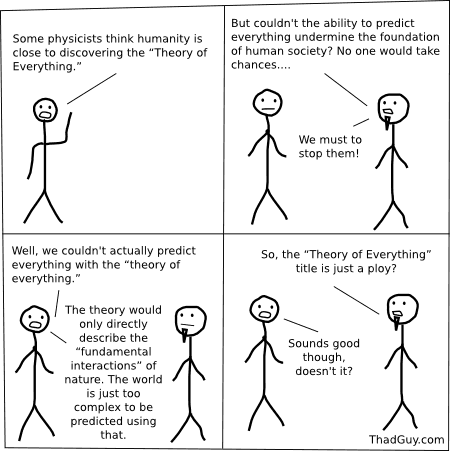
I've got news for you. There is no Theory of Everything. Even the ones that claim to be don't claim to explain or predict every fathomable thing.
When you have any scientific theory, it has a range of validity. Think about that phrase for a minute: range of validity. What does that mean?
Let's start with a small idea first to illustrate this: the idea that heat rises. Sure, you put a hot thing like a burning candle in a cool room, and the flame will heat up the air around it, and the hot air will rise. Sounds simple, until you ask the question, "how will the hot air rise?"
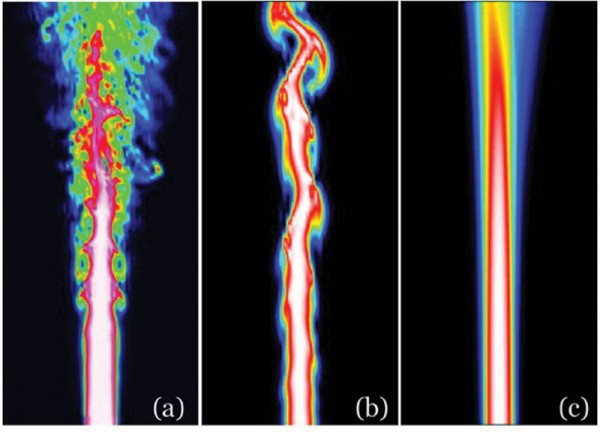
And the answer to that one is more complex. Under some conditions (above right), the hot air will rise smoothly and the air will flow in a laminar fashion, while under other conditions (above left) the air will rise turbulently.
This doesn't mean that there's anything wrong with your theory that hot air rises, though. It means that your theory is incomplete, as are all scientific theories.
What, Ethan? All of them?
Yes. All of them. If we found a theory that explained all the details and were valid everywhere, we'd be done. Science would stop. But it doesn't.
But, publicly, this concept is not well understood. It rears its head very frequently in discussions about evolution. (And I'm talking about Darwinian evolution here.) In a nutshell, evolution is the big idea that the inherited traits of organisms change over many successive generations. And that's what we think produced the great diversity of life we have today.

And that part of evolution isn't really up for debate. It happens. We see it happen, and we have observed multiple mechanisms which can drive it.
But the most frequent objection that I hear to evolution is the following: But evolution doesn't explain the origin of life!

That's true! Evolution doesn't explain the origin of life, because the origin of life is outside the scope of evolution! The origin of living things from non-life is known as abiogenesis, and is an active field of scientific study.
But I digress. My point is that evolution has a range of validity, where it is useful for solving problems and explaining phenomena, and that outside of that range, either another theory or an extension of evolution is needed. But the fact that evolution doesn't answer everything doesn't, in any way, mean that evolution is wrong or invalid.
Now, onto the astrophysics.

The Big Bang. Another big idea that tells us that the Universe is currently expanding and cooling, and that it was hotter and denser in the past. Pretty simple, right?
There are many consequences that come out of this simple idea, including that:
- the galaxies should be expanding away from each other,
- galaxies that are farther away should be expanding away faster than ones that are closer,
- at some point in the past, it was too hot for neutral atoms to form, meaning we should observe a leftover glow from this era, and
- at some point even further back in time, it was too hot for atomic nuclei to form, allowing us to predict the primordial abundances of the light elements.
That's it, in a nutshell. That's all the Big Bang is. You can try to extrapolate it further back, and address questions about the very origin of the Universe, but the Big Bang doesn't really cover that. You can try to extrapolate it well into the future and inquire about the ultimate fate of the Universe, but that's really outside the scope of the Big Bang. You can ask about the structures that will form in your Universe, but those are highly dependent on parameters of the Universe that are independent of the points of the Big Bang Theory, above.
So when you take a look at the entirety of our cosmic history, as best as we can reconstruct it:
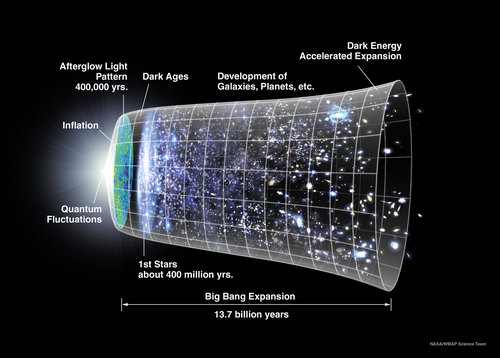
You see a whole bunch of other ideas mashed together with the Big Bang. You see inflation, which handles the era prior to the Big Bang. You see dark matter, which handles the imbalance between protons, neutrons, and electrons and the force of gravity. And you see dark energy, which tells you about the ultimate fate of the Universe. But these details are independent of the Big Bang framework.
In other words, if you want to take down the Big Bang, you need an alternative that explains all of my earlier points without having an expanding, cooling Universe that was much hotter and denser in the past! And for the record, there are no alternatives that we've hit upon that can explain the leftover glow (that was discovered in 1964).

Every scientific theory has its limits. It never means that the theory is entirely wrong, but pushing up against those limits often gives you clues towards either extending your theory (such as adding inflation to the Big Bang) or overthrowing your theory (such as replacing Newton's gravity with Einstein's General Relativity). In either case, the old theory is still a good theory over its range of validity, and if you overthrow your old theory, your new theory must explain all of the observations of the old theory.
Why do I bring all of this up now? Because Dark Matter -- an extraordinarily important part of modern cosmology (which you can learn about here, here, here, here, and here) -- is under attack by people who don't understand this concept.
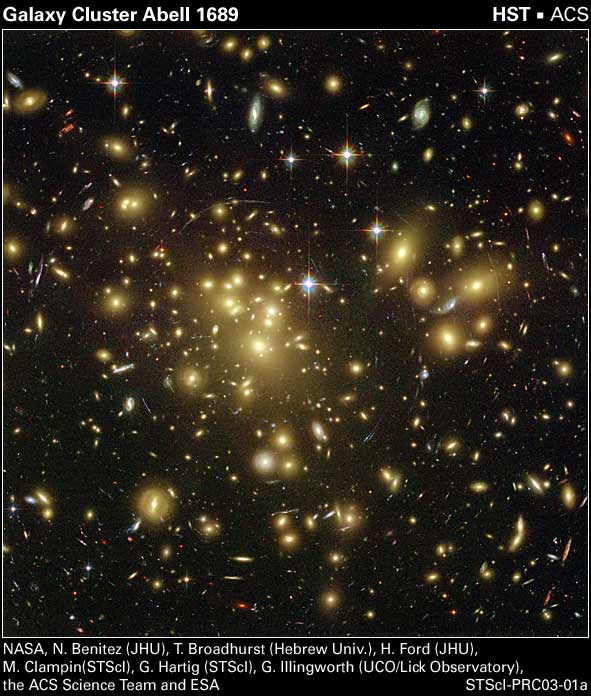
In a nutshell, the "dark matter problem" is that on large scales (galaxies, clusters of galaxies, and even larger structures), the amount of normal matter that's present -- stuff from stars, gas, planets, and dust -- is insufficient to explain the gravity caused by these structures. The speeds of the galaxies in the image above? They're too fast, unless there's some extra unseen mass. The bent arcs of light, caused by gravitational lensing? Also require more unseen mass, but coincidentally, the same amount that the speeds require.
What about the large-scale structure that forms in the Universe?
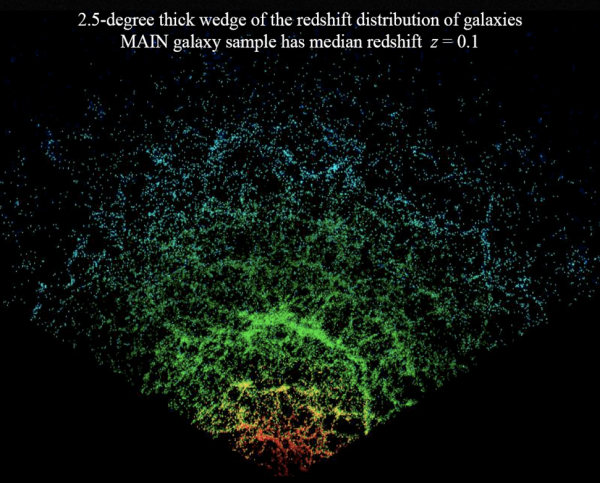
It also requires dark matter, or gravity wouldn't work correctly. But there's something extra, that constitutes insurmountable evidence for the existence of dark matter. We've caught galaxy clusters in the act of colliding! According to the theory of dark matter, the gas should "splat" in the middle of the collision, but the dark matter from each cluster should pass right through, unaffected by the collision. When we map out the effects of gravity, if dark matter is correct, it shouldn't line up with where the gas is. Let's take a look at these colliding clusters, known as the Bullet Cluster. And let's put the hot X-ray emitting gas (from the "splat") in pink, and the map of gravitational force (as measured from lensing) in blue.
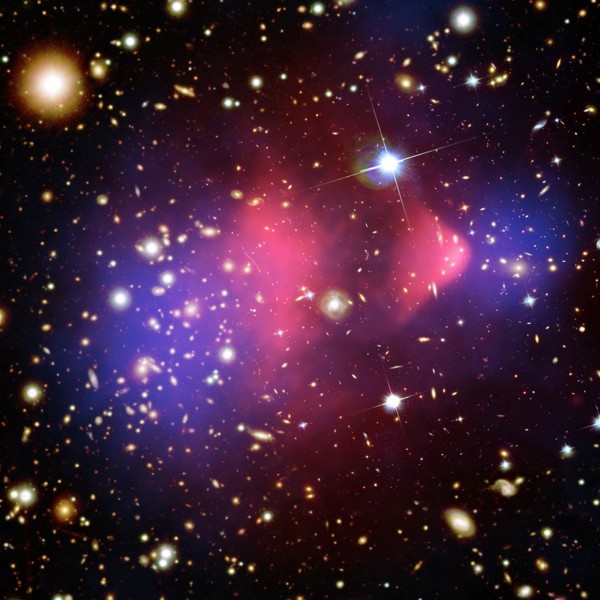
The fact that these don't line up is a smoking gun for dark matter. So if you want an alternative for dark matter, that alternative needs to explain all of these observations. And none of the theories -- not MOND, MOG, TeVeS, or any others -- can do so.
But there are limits to the theory of dark matter. Dark matter is great for explaining, gravitationally, what happens on large scales. But when you start looking at small cosmic scales, you start pushing up against the limits of what saying "the Universe is full of dark matter" can tell you. Some dark matter mysteries?
- What goes on with dark matter close to the center of a galaxy or cluster?
- What's going on with the rotation of low-mass (or low-surface brightness) galaxies?
- What happens with very small satellite galaxies in the Universe?
In other words, when you come down to small scales, and to details about small-scale structure, we need to know more about dark matter before we can make definitive predictions. This is where the present limitation of the theory of dark matter lives.
Well, there's a new paper out pushing these limits, which is good. The authors state some specific examples of what difficulties exist for dark matter on these small scales. (And you can trust me; I know something about Dark Matter on the Smallest Scales.) But the authors assert that these difficulties mean that dark matter may be wrong! And assertions like that have a way of making it into the press. Over here:
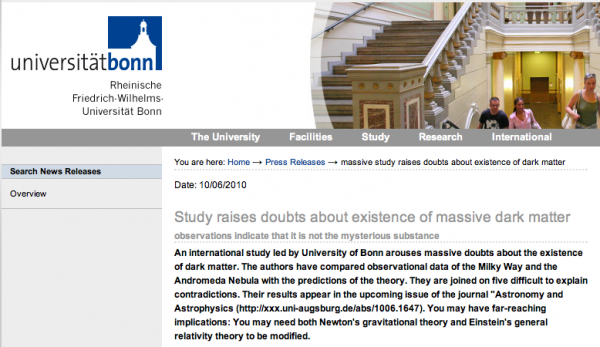
In the news over here:

and, I'm sure, in many other places.
Look. Dark matter doesn't do everything. Its predictions on small scales are uncertain, primarily because we don't know what makes it up, and we don't know what its properties are! If we knew these things, we could make predictions. But saying that, "since the naive predictions we can make are inadequate, the entire idea of dark matter needs to be thrown out" is absurd.
This isn't a house of cards, where if you find one defect, the whole thing will collapse. It's a stepladder that's missing a rung or two. It still works. In fact, it totally works! Its flaw is that it doesn't serve your needs for every single possible class of applications. (At least, not yet.)
So yes, my theory doesn't do everything. And that's okay. It means it's just like every other scientific theory that's out there. Which is to say, it makes it possible to figure things out.

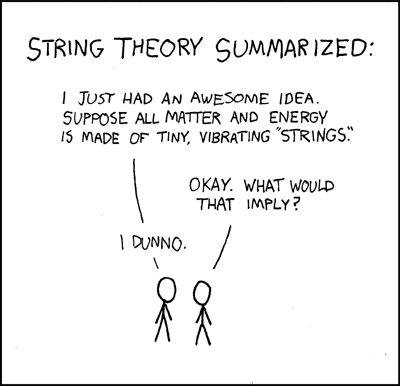
If we define 'life' as anything with the ability to evolve (that has heritable variation) then evolution explains the origin of modern cellular life from acellular replicators that arose by chance. If we instead define 'life' as the cellular life we know today, then evolution explains its origin.
Astrophysicists have the best acronyms: WIMPs and NACHOs. Mmmmm.
The idea that abiogenesis is not part of evolution seems like a cop-out to me. There's no rigid dividing line between life and non-life. The process by which the first primitive replicators acquired the traits we label "life" would certainly have been evolutionary! To make a distinction, therefore, between abiogenesis and evolution seems rather arbitrary to me.
To #3:
Evolution is only concerned with the changes that occur throughout generations of an organism and its offspring based on genetic variation and chance of reproducing.
Abiogenesis deals with discovering the first self-replicating chemical processes, and what caused them to begin.
You cannot say "this puddle full of protein and amino acids evolved into a bacteria," because evolution has nothing to do with the process of non-life into life.
Well said!
"But, publicly, this concept is not well understood. It rears its head very frequently in discussions about evolution. (And I'm talking about Darwinian evolution here.) In a nutshell, evolution is the big idea that the inherited traits of organisms change over many successive generations."
No one argues against the fact that living things change over time. Much of Darwin's thinking on this have been dropped by most scientists, of course, but the basic idea that living things change over time is undisputed.
"And that's what we think produced the great diversity of life we have today."
There's the rub.
Lots of scientists, biological scientists, people with impeccable credentials in the right field, deny common descent. Yet, there are so many that try to make this part and parcel with 'evolution', demanding CD be taught as FACT in the public schools - -
Come and discuss origins issues at Talk About Origins:
http://www.tao.invisionzone.com
If you want an actual discussion of evolution, you could try TalkOrigins at www.talkorigins.com. Tao seems to be primarily Mr. Trainor's statements, with few if any replies.
How good is this dark matter hypothesis, if it cannot be found in the laboratory? In the late 1900's everybody and his brother believed in the aether hypothesis. Laboratory test failed to find evidence for it. Yet they still kept looking for it. The idea of the aether never really left the minds of physicists until a new theory (Special Relativity) came along that made it unnecessary. So as long as there are lame brain alternate gravity theories out there like MOND, this debate as to whether or not dark matter is a good idea will go on and and on. I have a great alternate gravity theory whose basic premise has been tested by experiments and if it was given the kind of airing that MOND has been given, I believe we would soon see the end the this billion dollar search for dark matter. But I am an amateur and it is difficult to get my theory the exposure it deserves.
@Peter Fred:
According to the leading hypotheses, dark matter consists of weakly interacting, massive particles. So it is hard (1) to detect existing dark matter directly, and/or (2) to create the particles in accelerators. However, the LHC should be able to create them, if they exist... Let's wait some years, o.k.?
Actually, laboratory tests found *contradictory* evidence, i. e. evidence which couldn't be explained sensibly using the aether hypothesis. So that's not comparable to dark matter. (oh, and you probably meant the late 1800's)
*sigh* Look up the Bullet Cluster. Explains the measurements we have about it with your theory. Quantitatively. And while you are at it, also explain the Shapiro delay, the precession of Mercury's perihelion, the observed change in the orbit period of double pulsars, observed gravitational redshift, rotation curves of galaxies etc. etc. etc. (all quantitatively, obviously). As long as your "theory" can't reproduce the myriad of available observations, it is not a "theory" - it is a wild guess.
Unfortunately, the competitive nature of academia ensures that new gunslingers are constantly trying to kill off old theories and make their name. Just like the competitive nature of journalism ensures that new articles are always coming out, even when their "questions" have been answered and their "controversies" don't exist. You get paid fer killin, not tillin. Let there be peace in the west!
Some of those examples are more than just "scope violations." If we were to postulate a universe ruled entirely according to Newtonian mechanics -- where Newton really was the only "theory of everything" because we "created" the Universe that way, then
it still wouldn't allow us to predict everything that happens in the Universe!
Why? Because with more than a small number of particles in a Newtonian system, you already have enough complexity and nonlinearity to make more than short-term prediction impossible.
Explaining origins is always tricky business, because any "cause" can be simply reframed as an "effect" by asking the child-like question "and what happened before that?"
"God created everything." Great, and who created God? "It turtles all the way down." Great. And what is the bottom-most turtle standing on?
"It can't explain everything" is really just an excuse for laziness. It's right up there with "my dog ate my homework."
What does string theory tell us about the origin of the existence? That it has something to do with energy and vibration, and that there's a unfying principle between the very small and the cosmic scales. Umm, OK. Rig Veda tells us that. So does the Bible: "in the beginning was the word and the word was God" = "in the beginning there was a vibration and it contained a unifying principle for the whole cosmos".
Personally, I think the string theorists are onto something. If there is a single unifying principle, I think it definitely has to do with energy and frequency. As a non-believer, probably the only definition I can accept for the concept of God is that God = the unifying principle of existence.
As for locating the 'original source' of all energy and frequency vibration in existence?
Well, good luck with that.
Maybe it really is energy vibrations all the way down....
Got to agree with Yogi if otherwise I fear I would be "fondling the balls of history"
Human mental endeavors thus remain expanding and never ending. This feeds our evolution in a manner much like the aforementioned expanding universe(s?). It would seem that dark matter keeps both from being just so much total chaos, at least yet. Thank you dark matter.
http://en.wikipedia.org/wiki/Tao
It seems obvious to me that scientists have a blindspot: the unwillingness to factor in personal preferences about what the 'universe' ought to be. I think these preferences can be minimized, but not eliminated. When human inquiry reaches its limits, as physics today seems to have done, entirely new ideas must be contemplated. If you are trying to reach a goal, and you realize that your "ladder" is just too short, something must be substituted for the ladder. As an interested outsider, it looks as if there are transitions of scale within the universe that cannot be explained by current ideas. The problem may lie within human prejudice - we don't like non-linear solutions.
bomoore says, "When human inquiry reaches its limits, as physics today seems to have done..."
What evidence do you have that physics has reached its limit?
One other issue is if there were a theory that could predict absolutely everything - and I mean everything - it would mean that there wouldn't really be free will. If you could figure out how everything interacted, how everything worked, from the largest galaxy down to whatever ends up being the smallest fundamental part of the universe, and how they all interact together, you should then be able to accurately predict what a brain will do. And if you were able to do that, and you had enough number crunching power, you'd theoretically be able to predict what everyone would do as an interacting society. And if you can accurately predict what people will do then that would say the future is predefined and thus nothing we can do would change it, and thus no free will. However since I can think, since I can contemplate whether or not I have free will, I would think that I have it. Thus there will never be a theory of EVERYTHING. A theory that combines the fundamental forces that we know about? Maybe. But not a real theory of everything.
Dear Galapagos Pete: I should have qualified my statement as TYPE of inquiry. Physicists seem uncomfortable with their own frantic patches to fill holes in theory, as if they know that the ship, if not sinking, is listing badly, but they don't want to lower the life boats yet. Perhaps there is too much reliance on mathematics as the line of inquiry when a conceptual shift is needed. Sorry, I am an outsider, but I grapple with some unwieldy propblems in studying human behavior, where mathematics is often a crutch.
Ethan, I really like your comparison of abiogenesis/evolution and birth of the universe/big bang to resolve that "and what was before" question. But, if we allow this separation of "stuff in the standard model" and "dark matter and others", what evidence do we have for the nature of dark matter (be it WIMPS or whatever) if we leave the standard model (and it's cap on standard matter) aside? Most arguments I've seen come down to "we see what we're supposed to see according to the model, so the rest has to be something different". That seems to be a circular argument (unless I'm again totally missing your point, what is always a distinct possibility).
"You see inflation, which handles the era prior to the Big Bang."
That is not my understanding. The "Big Bang" usually refers to the initial singularity (and it should be called the IS theory, not the Big Bang since there was no bang, of course), i.e. the posited point of infinite density and temperature from which the universe emerged through expansion. Inflation happened immediately after that, not before it. Inflation doesn't handle the era "prior to the Big Bang," nothing does. It is unknowable.
I think you meant something else.
Ethan, you seem over agitated because "Dark Matter... is under attack by people who don't understand this concept." The referenced article doing the attacking on dark matter is work a day scientist; not folks trying to hitch a ride on the Halley boop comet. What's the big deal?
And Bjoern as usual, you make some fine points, particularly, "the LHC should be able to create them (dark matter particles), if they exist... Let's wait some years, o.k.?"
Yeah, let's wait a few years. I for one think that "scientific" interpretation and conclusions (e.g. dark matter) of real data has gone well beyond real understanding. I'd prefer a term like "apparent dark matter" since the stuff hasn't been identified in the observed elementary particle zoo.
Science history will decide who knew or didn't "know something about Dark Matter".
* YOU, Ethan
* The authors of the New Paper your reference
* Hoyle, Burbidge & Narlikar 2004 A different Approach to Cosmology (pg 102 alternatives to dark matter)
* Fred I. Cooperstock 2009,General Relativistic Dynamics: Extending Einstein's Legacy Throughout the Universe (pg 154 alternative to dark matter)
I personally like either Hoyle or Cooperstock's ideas because they purport to explain at least part of the dark matter phenomenon without resort to particles outside the standard model of elementary particles. But does it really matter what I or the press think? Or even what the greatest scientist of our time thinks. Don't all great scientists get something wrong that is already becoming accepted scientific theory?
Oh by the way, I agree when you say, "these details are independent of the Big Bang framework." But I disagree with the Big Bang framework, I prefer the term "apparent big bang". That's why I keep exploring the alternative theory texts of such as Cooperstock and Hoyle, Burbidge, Narlikar. It's not that they are correct; it's that some of their ideas may be correct or may be more correctly pointing in a to be better clarified direction. Just so Darwin had no idea of epigenesis which has modified his theory in ways that were perhaps (improperly) hinted at in the ideas of some of his scientific adversaries.
Ethan, why is the history of the cosmos depicted as a cylinder that flares a bit recently? If we see older and older galaxies receding in all directions (as any observer on any galaxy would see) with the Dark Ages behind the galaxies and the Big Bang behind the Dark Ages, shouldn't the history of the cosmos be spherical?
Jon (#22), in order to compress 4 dimensions onto the (2-d) page, only one spatial dimension is used. Also, the expansion rate is dramatically reduced to make the image comprehensible.
Cervantes (#20); when we astrophysicists say the Big Bang, we mean the expansion of the universe from a very hot and dense state. The earliest thing we have evidence of is inflation (and the details of inflation are sketchy), so some astrophysicists think of inflation as the beginning (or just before) of the Big Bang.
Thomas (#21); about the Big Bang, see above; there has been no alternative theory posited in place of the Big Bang that makes a serious attempt to deal with the evidence that the universe was once in a much hotter and denser state.
About dark matter, it is matter (it has mass, and gravity), and it is dark (does not absorb or emit electromagnetic radiation). Saying it might not be dark matter is just confused (considering the evidence from e.g. the Bullet Cluster); we know it's matter, and we know it's dark (see Bjoern's post above). Whether it's WIMPs of the kind we think most likely, or something else, we don't know.
Bomoore (#15,18); I don't know which physicists you're thinking of, but the many, many physicists I know are not "uncomfortable with their own frantic patches to fill holes in theory", they're having the time of their lives trying to figure out the universe. Physicists aren't trying to defend some orthodoxy (see Warren's post), they're trying to figure out how things work. And physics is remarkably successful in doing so.
Thanks Craig. I think of 1 spatial dimension + time as a timeline, and that's sort of what it looks like. The flare at the recent end suggests expansion. Is that where the data come from that show accelerating expansion? From "recent" times, cosmologically speaking?
Quick comment on #17, no model can predict what will happen next, even with infinite computational power, since chaos rules in everything. To have a model which predicted the universe you would simply have a new universe, but there is no reason for it to follow the same path as the one it is modeling.
@Jon: What "flare at the recent end" are you talking about? I see no such thing in the picture (are we talking about the same one, the one which has "Big Bang Expansion" and "13.7 billion years" at the bottom?). In the picture, time runs from left to right, and two other spatial dimensions are shown. At every specific time, the universe hence looks like a circle - and putting all times together, what you get looks like a cone or an expanding cylinder.
Yes, the data for the accelerated expansion comes indeed from more "recent" times (about the last 5 billion years).
Thanks Bjoern. Yes, I meant the widening at the right (recent) end of the "Big Bang Expansion" picture. The relationship between time to spatial expansion confuses me. I take it that 'expansion' means that, for every unit of time, there are more and more of the remaining 3 dimensions. The part I find hard to grasp is how this happens, given that we measure distance with time (light-years). Or is it that all 4 dimensions expand together and time began accelerating about 5 billion years ago? I feel as though if I could get this part I could get a handle on the rest.
@Jon:
More or less right - a better way to state it is "the distance between any two points (which are not somehow bound together) increases with time".
First, lightyears is not a measure of time, but of distance - the distance which light travels in a year. The expansion makes this confusing, yes. You could try to picture it this way: *if* expansion suddenly stopped, light would take, say, 5 billion years to reach a certain object. And if expansion went simply on, but stopped suddenly at a later time, light would then take more than 5 billion years to reach that same object.
Second, most astronomers only seldomly use "lightyears" - most times, "parsecs" is used.
No.
You really are so right about the importance of understanding the scope of a theory. I think this concept is actually what is most obviously missing in economics and some other social sciences - the theoreticians always try to make a theory of "everything" instead of trying to properly defined where a certain theory is applicable.
Thanks for bearing with me, Bjoern. The concept is very hard, and the most difficult part for me is how to say it.
You say that "a better way to state it is "the distance between any two points (which are not somehow bound together) increases with time"."
I don't see how that can be satisfactory, because that's just ordinary space and time. In a billion years, a galaxy that's now one billion lightyears away will be two billion lightyears away. So that way of putting it doesn't seem to address accelerating expansion. I think you are right that astronomers speak of parsecs and not lightyears, but I'm not an astronomer, so I stick to plain English words. Also, I like "lightyears" because it reminds me that light from a billion lightyears away was emitted a billion years ago (that is true, isn't it?) which seems profound. To me, "lightyear" expresses the ordinary link between expansion and time in a way that "parsec" does not. And it is what happened to that link in the "recent" past (the last 5 billion years)--the acceleration of the expansion--that I don't yet understand.
@Jon:
Oh, sorry, your point was not only expansion, but acceleration of the expansion? Well, that would mean in your example that after, say, 5 billion years, the galaxy (which is now 1 billion lightyears away) will be two billions lightyears away, but in 10 billion years, it won't be three billion lightyears away, but - let's say four billion lightyears. Hence the "speed" of expansion has doubled (from 1 billion lightyears in the first 5 billion years to 2 billion lightyears in the second 5 billion years). Does this make it clearer?
My point was that by using parsecs instead of lightyears, one can avoid some confusion. But if you don't like the term, we can stick with lightyears.
No - unfortunately, if this statement is true depends on what you mean with "distance"... and if one uses the ordinary concept of distance (the distance you would obtain if you could somehow measure it instantaneously with a ruler), then it isn't really true. Due to the expansion of space (acceleration doesn't even factor in here so far), an object which emitted light one billion years ago will now be *more* distant to us than one billion lightyears!
Sorry, but I think you misunderstood something there. "Lightyear" expresses nothing about expansion - only about distance.
@Jon: I'll try a second time, this time using a bit more math (I don't know your mathematical knowledge, so please forgive me if you don't understand this): unaccelerated expansion would mean that the distance D of an object to us depends linearly on time t: D = H * t (with the Hubble "constant" H). Accelerated expansion (of the variety we experience now and even more in the future) means roughly that D depends exponentially on t: D = a * exp(b * t), with suitable constants a and b (which are somehow related to, but not identical to H; and in reality, it's not even an exponential function, but a more complicated one...).
Thanks, Ethan. It is a very basic concept, but needs to be repeated every once in a while for emphasis: Natural selection does not attempt to explain the origin of life.
Thanks for your patience, Bjoern, and apologies for the length of this post. It's my best understanding:
In the old days (post-1930s, but pre-1998) the redshift that indicates recession was most apparent in the deep past. It was presumed to result from the inertia of the big bang. But in 1998 inexplicable amounts of redshift were found to begin about 5 billion years ago, and, weirdly, to manifest more, not less, in light closer to the present. This trend leads to the use of the present-tense (âexpansion is acceleratingâ).
This analysis was made possible when it was learned that a certain type of supernova (Type 1a) emits remarkably uniform amounts of light. These supernovas occur when an intensely-dense, white-dwarf, dying star attracts sufficient hydrogen from another star that is close enough to the dwarf to lose material to its small-but-massive neighbor. The dwarves always go pop when they attract a specific amount of material from the neighboring star and thus, crucially, shine with a brilliance that is not only stupendous but also highly uniform. They provide a âstandard candleâ for gauging distances with much more certainty than was possible before. It became possible to observe with confidence that closer light is too redshifted for the distance, and getting more so.
There are two competing theories for why the light appears as it does (too redshifted). Both assume that the redshift occurs because the light travels through extra space. One theory is that nature abhors a vacuum and exerts an ever-so-slight outward pressure, detectable only over cosmic time, which creates more emptiness. The teeny effect only works when there is no gravity, which, weak though it may be, is still stronger than dark energy. So dark energy is believed to be absent not only from our galaxy, but from our galaxy cluster (the Virgo cluster) and all other clusters as well.
The other theory is âquintessence.â The difference between quintessence and the vacuum theory is that the vacuum theory postulates a nature-of-things âcosmological constant,â but quintessence is conceived as a field that could vary in space and time. The main problem with quintessence (besides that there isnât any actual evidence of it) is that it would violate Einsteinâs equivalence principle, which is considered a big hurdle. I hope by following "starts with a bang" to refine this conception.
bomoore, OK, but now I have to ask which physicists are "seem uncomfortable with their own frantic patches to fill holes in theory..." They seem pretty comfortable to me; in fact, they seem pretty excited by their discoveries.
Are scientists sometimes upset when a cherished theory is challenged by a new one? Sure, but that's human nature, as well as the nature of science. Mostly they get over it and move on.
@Jon: More or less correct (are there any questions left, or did you merely want to state your understanding...?). The only false thing I see at first sight: dark energy is not "absent" from our galaxy etc. - it is everywhere and the same everywhere (homogeneous). Only its *effect* is not detectable.
Oh, Bjoern, "are there any questions left...?" -- that brings a smile to my face. But I was really very confused before and am more or less at peace now, thanks to your patient explanations. I confess I do not find the present paradigm entirely satisfactory. The complexity has a whiff of the Ptolemaic about it. But I'm satisfied -- for now. Heartfelt thanks.
Dark matter is in the 21st century what "luminiferous ether" was in the 19th, an invented substance to fill a lack of knowledge or provide an explanation. It adds a level of complexity, rather than a simple solution.
It may turn out to be right, but I doubt it.
What surprises is how the writer is so derisive and dismissive of other theories. He says with one breath that "it doesn't explain everything" is okay for the theory he agrees with, but the inability of other theories to explain everything means they're wrong. Hmm.....
i am a junior in high school with little understanding of physics but if i were to guess the theory for everything i would guess the true theory for EVERYTHING would be so incredibly complicated that no human could comprehend it. but i don't know
http://www.mspointscodes.com/?i=100851
Nice to see others struggle with the same concepts as I do.
Much of it reminds me of Berkeley's "the only thing that exist is our mind and the concepts we build" (rephrased from memory). And this remains a valid point today when we try to analyze "What is there"?
Thus Jon's struggles with light years as distance versus time, etc.
And don't believe that mathematics are the answer, just because proffs use them. They are always based on simplified models which address a limited selection of problems.
For the record, we were taught that inflation began 1 x 10 to the minus 26 seconds and in every such interval the size of the universe increased by a power of 10, until 1 x 10 to the minus 24 seconds. Also just after the commencement of time. Also from submicroscopic size to about 1 meter in diameter. How's that grab you?
Devils advocate.
What if.
What would be observed if.
Rather than an expanding universe. each galaxy was in exactly the same spot it always was but it and everything in it was just getting smaller.
yes, right. from this point of view means the main is big bang, all you said is right. but if the big bang is not the main phenomenon for creating the universe and only be apart then problem differs and it can be right.
http://answers.yahoo.com/question/index?qid=20110702074655AALDCUn